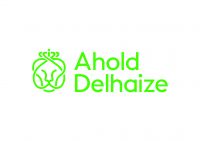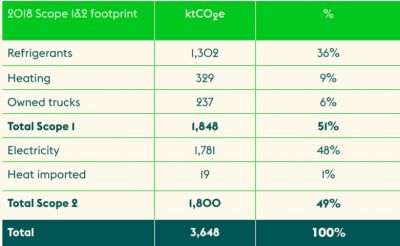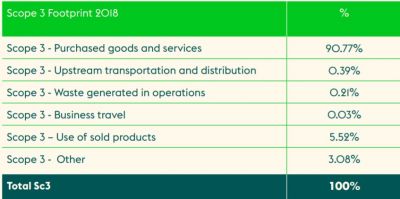Difference between revisions of "AholdDelhaize"
ManonVeltman (talk | contribs) |
|||
| Line 137: | Line 137: | ||
== Conclusion == | == Conclusion == | ||
Beschrijving of de plannen in lijn zijn met 'Parijs' | Beschrijving of de plannen in lijn zijn met 'Parijs' | ||
Revision as of 14:54, 1 March 2022
Koninklijke Ahold Delhaize N.V, stylized as Ahold Delhaize, is a Dutch multinational company owning various brands active in the food and retail sector. It was founded in 2016 after Ahold and Delaize Group merged. The company is headquartered in Zaandam, the Netherlands, and is active in various European countries, the US and Indonesia. Since 2018 its CEO is Frans Muller. The company’s shares are listed on Euronext Amsterdam and Brussels and had a revenue of €74.7 billion in 2020.
Company Structure
Executive Committee
- Frans Muller (CEO)
- Natalie Knight
- Kevin Holt
- Wouter Kolk
- Ben Wishart
- Jan Ernst de Groot
Supervisory Board
- Peter Agnefjäll (chair)
- Bill McEwan
- René Hooft Graafland
- Helen Weir
- Katie Doyle
- Mary Anne Citrino
- Frank van Zanten
- Bala Subramanian
- Jan Zijderveld
Accountant
Accountant van het bedrijf
Operations
uitgebreidere beschrijving van het bedrijf en wat ze doen en of ze koninklijk zijn en NOW steun
Paris Agreement to Today
In November 2021 ClientEarth and the Plastic Soup Foundation filed a joint complaint against AholdDelhaize at the Autoriteit Financiële Markten (AFM) regarding transparency on the usage of plastic waste. The AFM is the Dutch authority supervising the behavior of participants in financial markets and falls under the supervision of the Dutch minister of finance, which at the time was Wobke Hoekstra. According to the environmental organizations AholdDelaize did reported insufficiently on its plastic waist in their annual report, violating EU guidelines.
In November 2021 AholdDelhaize stated to strengthen their commitments and set the target to reduce the emissions of their own emissions to net zero by 2040. However, this would not include their scope 3 emissions which account for the vast majority of their total emissions.
In may 2021 AholdDelhaize, along with other companies, signed an open letter to the Brazilian government to stop legislation that would make deforestation for agriculture in Brazil (mostly soy) easier. However, according to a Greepeace study Albert Heijn nevertheless makes about 40 million euros of profit from Brazilian soy beans, while 22% of all Brazilian soy exported to Europe is the result of illegal deforestation according to a study in Science magazine.
Current Policies and Emissions
Scope 1 & 2: 3,648 Kton Co2
These are the emissions of their own operations. The biggest contributors here are electricity with 28% of total scope 1 and 2 emissions and refrigerators with 36%.
Scope 3: 70,800 Kton Co2
The scope 3 emissions are emissions from their value chain. By far the biggest portion of AholdDelhaize’s total emissions can be attributed to their scope 3 emissions. The biggest contribution in scope 3 comes from purchased goods and services, namely 90.77%.
Climate Plans
In their 2020 sustainability report Ahold Delhaize put forward two two key ambitions. First of all, they want to reduce absolute emissions from their own operations (scope 1 and 2) by 50% between 2018-2030. Secondly, they want to reduce absolute emissions from their value chain (scope 3) by 15% between 2018-2030. They also aim to be net zero (scope 1,2 and 3) in 2050 and remain under 1.5 degrees celcius as committed through their partnership with the Race To Zero trajectory of Science Based Targets initiative (SBTi).
Ahold Delhaize has put little concrete plans in their 2020 sustainability report to live up to these goals. With regard to scope 1 and 2 emissions the company plans to invest in energy efficiency and reduce energy consumption in their stores. Ahold Delhaize also commits itself to improve its refrigeration systems and accelerate the replacement of hydrofluorocarbons (HFCs). No targets on investments or energy concumption, however, are set in their report on energy consumption in their stores.
The company says it will reduce its scope 3 emissions by relying on improvements from partners in their value chain, for example by developing and implementing new technologies. No specific targets or short term goals have been set for the various sectors in their value chain.
Conclusion
Beschrijving of de plannen in lijn zijn met 'Parijs'


